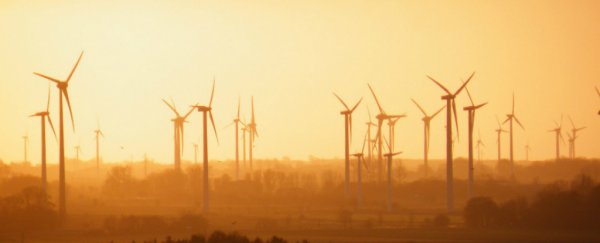Mark Z. Jacobson, a Stanford University professor who has prominently contended that the United States can fully power itself with wind, water and solar energy, is suing the National Academy of Sciences (NAS) and the lead author of a study published in its flagship journal that criticised Jacobson's views - pushing an already bitter academic dispute into a courtroom setting.
The suit, which asks for more than US$10 million in damages and retraction of the study, charges that lead author Christopher Clack "knew and was informed prior to publication that many of the statements in the [paper] were false".
It adds that the NAS "knowingly and intentionally published false statements of fact" in the Proceedings of the National Academy of Sciences (PNAS) despite being aware of Jacobson's complaints.
Jacobson declined to comment on Wednesday, and William Kearney, a spokesman for the academy, said it does not comment on pending litigation.
"I am disappointed that this suit has been filed," Clack said in an emailed statement.
"Our paper underwent very rigorous peer review, and two further extraordinary editorial reviews by the nation's most prestigious academic journal, which considered Dr. Jacobson's criticisms and found them to be without merit. It is unfortunate that Dr. Jacobson has now chosen to reargue his points in a court of law, rather than in the academic literature, where they belong."
Clack's study had 21 authors, but Jacobson's lawsuit only names him and the academy.
The other authors include a number of high-profile academic names in energy and climate change research and policy - a list that Jacobson charges magnified the impact of the article in the media and thus the damage to his reputation.
"We stand behind the paper, and we think this is a scientific issue that needs to be debated by scientists and not in the courts," said one co-author, who spoke on the condition of anonymity because of the ongoing litigation.
The suit was filed in late September in the Superior Court of the District of Columbia.
The dispute turns on Jacobson's idea, itself published in the PNAS and other journals, that it is feasible to construct a grid for the entire country that would be powered entirely by wind, solar and water energy (hydropower), with additional help from forms of energy storage.
"No natural gas, biofuels, nuclear power, or stationary batteries are needed," Jacobson and his colleagues wrote in 2015.
This idea of "100 percent clean energy" has been embraced by many environmental and climate change advocates, including actor Mark Ruffalo and Senator Bernie Sanders (I-Vt.).
And no wonder, for it presents a highly ambitious and optimistic outlook on how the current transition toward clean energy - which would be central to stopping climate change - could continue to develop.
But Clack argued in PNAS earlier this year that Jacobson's idea was not only infeasible but also that his work used "invalid modelling tools, contained modelling errors, and made implausible and inadequately supported assumptions".
He and his co-authors said the transition toward cleaner energy will require "a broad portfolio of energy options," which presumably includes nuclear power, carbon capture and storage, and more.
That's where the legal dispute begins, since Jacobson charges that after seeing that study prior to publication, he sent a list of its purported errors to the NAS.
These were not corrected in the final published version, his lawsuit says.
One of his greatest objections is over the claim that his work contained "modelling errors," which turns on a technical dispute over how much US electricity could be provided by hydropower and how much the current system of dams can be altered to increase their electricity-generating capacity.
This claim is "particularly harmful and damaging to Dr. Jacobson's reputation because his primary expertise is in computer modeling," the suit asserts.
Clack and his colleagues published a lengthy response to Jacobson's complaints in June, disagreeing about the point on hydropower and much else. Jacobson's study "has been shown very clearly to contain a large number of fundamental errors," the response said.
According to court documents, the academy has until November 27 to respond to the lawsuit.
2017 © The Washington Post
This article was originally published by The Washington Post.
